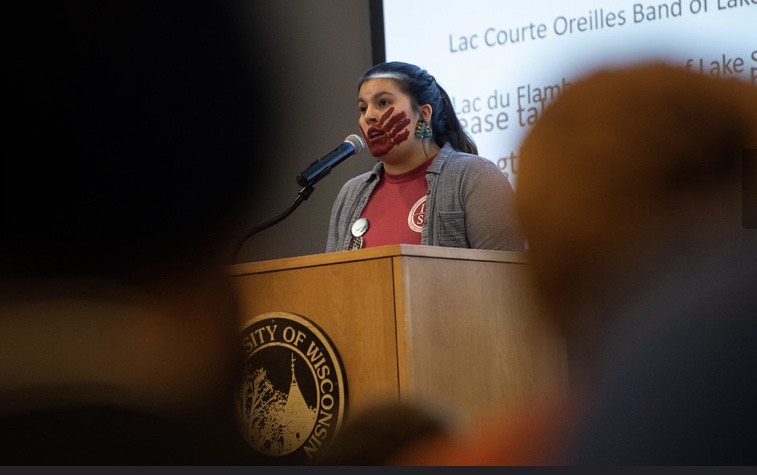Life as a Native American student at UWO
DePerry speaks at Take Back the Night on the crisis of missing and murdered indigenous women.
November 15, 2019
Bozhoo (Hello)! My name is Tatum and I am a member of the Red Cliff Band of Lake Superior Chippewa and I also have ties to the Stockbridge-Munsee Band of Mohican Nation. However, being an enrolled member or a “card-carrying Indian” does not define what it means to be Native American.
When other people talk about my identity, I prefer they use the terms Native American or Indigenous. However, it is important for people to know that every indigenous person may be more comfortable with another term.
My life on a predominantly white campus has been nothing short of hard. Every day I walk the line of choosing to embrace being Native American or trying to hide my identity.
Some days it can be so much easier to hide who I am and blend in with the crowd. But as I have grown in my two years here, I realized that I need to embrace my identity and not hide who I am. And yet, I struggle.
I struggle with my peers who say things like “You are so lucky to be native” or “Do you live on a reservation?”
Sometimes I will correct them and explain why saying those things can be ignorant. But there are other days where I simply do not have the energy because at the end of the day, I am here to get an education, not educate my peers.
I struggle with professors who say things like “Native Americans pray to the trees” or when talking about us in history, we are the conquered “Indians.”
I struggle as I watch my peers make friends so easily in the residence halls, but I am only close to those who share similar experiences as me — it’s just easier that way.
I have felt excluded in the classroom, residence halls, dining halls and almost everywhere on this campus. There are days when I just want all the questions about my identity or the stares from those who are trying to figure out what race or ethnicity I am to just got away. But we do not live in an ideal world.
Lucky for me, I have found a small community that has supported me and made me feel so welcomed.
It started when my mom put me in touch with a friend of hers who worked at UWO, Dennis Zack, the American Indian support services coordinator here on campus.
Dennis is one of the reasons why I found such a strong community here on campus. The Inter-Tribal Student Council (formerly known as ITSO) has been such a big part of my academic success since I first set foot on this campus as a freshman.
We are a small organization, but it is a family as we are away from home. We share that same Native American humor, some of us come from rural areas and some come from urban areas, but at the end of the day, we are all Indigenous and we are all family.
I truly believe there are people on this campus who want to see me succeed; there is Dennis Zack, who is also the co-advisor for ITSC, and there is Dr. Heidi Nicholls, an anthropology professor who also the co-adviser for ITSC.
These two wonderful human beings have made my journey here so much smoother. They understand my struggles and help me navigate a campus that does not always want to see me.
While the pressure of trying to fit in and be heard can be so overbearing sometimes, my community on this campus and my family back home who want me to succeed make it so much easier.














